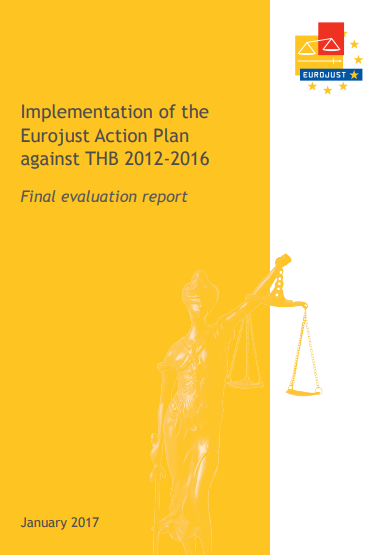Executive Summary
The nature of Trafficking in Human Beings (THB) cases present inherent difficulties for investigations and prosecutions. Most of these obstacles were identified in the mid-term report on the implementation of the Eurojust Action Plan against THB and are confirmed by this report. Indeed, THB investigations are complex, involve increasingly well organized groups, target vulnerable victims and generate profits that are hard to track and to confiscate.
Eurojust casework reveals a better understanding of THB specifics by practitioners, a higher level of coordination which, in turn, translates to a larger number of Joint Investigation Teams being set up, as 75 % of the analysed THB cases with a coordination meeting at Eurojust in 2014/2015 translated into a JIT.
In addition, the higher percentage of coordination meetings, organised by Eurojust with the competent national authorities in THB cases can be regarded as an indicator of the willingness and availability of national authorities to cooperate on a higher level, with the assistance of Eurojust, in order to meet the challenges induced by the complexity of THB cases.
It is noteworthy that, in a general context of scarce resources, the allocation of significant financial means to set up JITs and agree on other facilitation tools indicates that the cases brought to Eurojust were assessed as deserving Eurojust’s financial and operational assistance.
Finally, an important milestone has been reached with the setting up of the first two JITs in THB cases between an EU Member State and a third State.
In terms of methodology, the Evaluation highlights challenges related to the reliability of the data made available. The report shows that beyond the mere exercise of evaluating the Eurojust Action Plan, reliable and complete data are key to designing and promoting a tailor made, informed and accurate policy response to THB. In this respect, Article 13 notification feeds the process of collecting and analyzing relevant information. Such information is essential to identifying potential links to other cases registered at Eurojust and more generally triggers Eurojust’s further support where and when appropriate.
THB calls for more cooperation at the EU level to ensure a coordinated holistic repressive approach to circumvent the procedural, practical and legal obstacles that may arise, and particularly the difficulty of gathering solid and admissible evidence. The Agency remains therefore committed to continuing supporting practitioners through JITs and other relevant means, and further disseminating its experience and knowledge as an integral part of this facilitating role.
Eurojust’s added value in this respect was underlined by practitioners as pivotal in facilitating judicial cooperation to fight the increasingly complex crime type that is THB.

